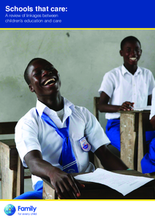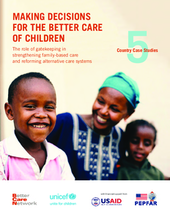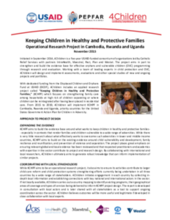This country page features an interactive, icon-based data dashboard providing a national-level overview of the status of children’s care and care reform efforts (a “Country Care Snapshot”), along with a list of resources and organizations in the country.
demographic_data
childrens_living_arrangement
children_living_without_bio
adoption
social_work_force
key_stakeholders
Key Stakeholders
Add New DataOther Relevant Reforms
Add New Datadrivers_of_institutionalisation
Drivers of Institutionaliziation
Add New Datakey_research_and_information
Key Data Sources
Add New DataReport on National Assessment of Centres caring for Children with Disabilities in Rwanda
National Integrated Child Rights Policy
Country Care Review: Rwanda
Prevalence and number of children living in institutional care: global, regional, and country estimates
The Way Forward Project Report
Community-Based Child Protection Mechanisms in Refugee Camps in Rwanda: An Ethnographic Study
Displaying 121 - 130 of 188
This report presents the key findings of a scoping study on the links between education and children’s care. The study involved a literature review in English, French and Spanish; key informant interviews; and consultations with 170 children, carers, teachers and other stakeholders in Guyana, India, Russia and Rwanda.
Published jointly with UNICEF, this new BCN Working Paper focuses on the role of gatekeeping in strengthening family-based care and reforming alternative care systems. This Working Paper reviews different approaches to gatekeeping in five countries--Brazil, Bulgaria, Indonesia, Moldova, and Rwanda--to consider what has and has not worked, to analyze lessons learned from practice, and to reflect on the implications for improving policy and programs in this area.
This article recounts the story of two children who spent the first five years of their lives in Rwanda’s largest and oldest orphanage, the Noel Orphanage. With support from the Ishema Mu Muryango (“Pride for the Family”) program in Rwanda, the children have been reunited with their older sister. Ishema Mu Muryango receives support from USAID’s Displaced Children and Orphans Fund and aims to reintegrate children from institutions into their families or communities.
This two-page brief from USAID describes the “Keeping Children in Healthy and Protective Families” project, a project that is part of 4Children that “focuses on strengthening family care among households at high risk of children separating or where children can be reintegrated after having been placed in residential care.”
The purpose of this consultancy is to conduct an assessment of institutions providing care and accommodation for children and young adults with disabilities in Rwanda.
Pour la plupart des Burundais qui ont fui la violence qui règne chez eux, le camp de Mahama au Rwanda sera leur domicile provisoire. Comme dans n'importe quel conflit, les gens se trouvent non seulement arrachés de leurs foyers, mais aussi, souvent, de leurs familles.
On June 29, 2015, the CPC Learning Network hosted a webinar focused on the experience of developing, piloting and refining a child protection index.
Hope and Homes for Children announces that the last child has just been moved out of Rwanda’s oldest and largest institution.
The United States Agency for International Development (USAID) through its Displaced Children and Orphans Fund (DCOF) supported a sub-regional workshop held in Kigali March 23-26, 2015 to provide structured opportunities for technical exchange on care reform, approaches, methods, and tools. This report summarizes the activities and discussions from the workshop.
This article describes the deinstitutionalisation initiative in Rwanda.




